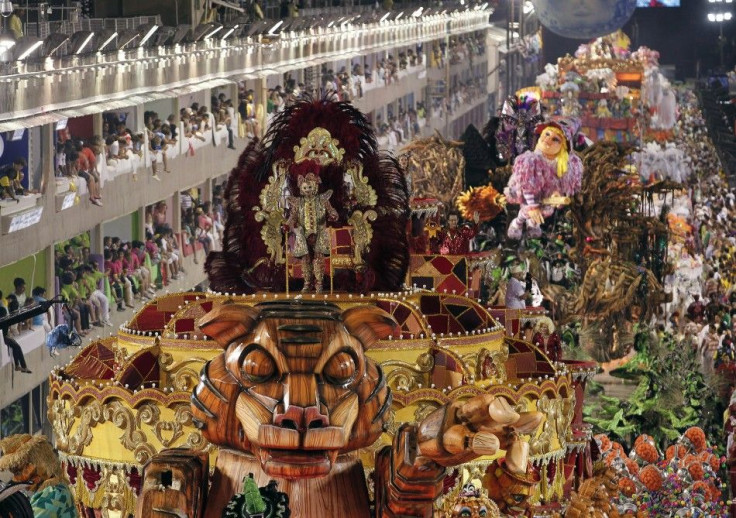Rio Carnival 2013 By The Numbers

Few acts of repentance could be as fun as the Rio Carnival.
Considered a farewell to the pleasures of the flesh before the start of Lent, this purposefully profane event is the benchmark against which every other carnival in the world is compared. Indeed, it’s one of the most famous artistic events on the planet.
Carnival’s roots lie in the last-minute carousal that traditionally took place before the austere Catholic season of Lent. In Rio, festivities kick off on Friday and reach a fever pitch by Sunday and Monday nights with parades of elaborate floats and scantily-clad samba queens at the 72,500-seat Sambadrome.
Due to its massive scale, authorities have used each Carnival to test the city’s preparedness for two major upcoming events: The 2014 World Cup and 2016 Summer Olympics.
More than 900,000 international tourists are expected to attend this year, up 5.8 percent over last year, and they’ll spend an estimated $665 million in accommodation, food and drink, according to Rio officials. In total, City Hall claims there will be some 6 million revelers spread over 492 street blocks and almost 700 parades. Hotels, meanwhile, are reporting 95 percent occupancy.
“Since 2009, the event has been growing immensely, while at the same time, staying in tune with the city, the locals and the tourists,” said Rio’s secretary of tourism, Antonio Pedro Figueira de Mello. “It keeps getting better every year, and that shows.”
Marcus Melchior, director of Rio’s Traffic Engineering Company (CET-Rio), said 985 people will be involved in enforcing the rules of Carnival 2013, an 25 percent increase over last year.
“The operational street traffic scheme has been evolving in accordance with Rio’s Carnival structure,” he said, noting that 56 message panels will inform the public of traffic conditions.
The Rio Operations Center will monitor all events, allowing the CET to make adjustments where needed.
The City Clerk also put together a special operations team of some 7,773 agents to maintain control, in addition to 1,050 street sweepers who will keep Rio clean.
“The objective is to suppress habits such as urinating in the streets, unauthorized peddlers, schedule enforcement for street block parades and irregular parking,” Special Secretary for Public Order Alex Costa stated, adding that the city will have 16,200 chemical toilets.
City Officials in South America’s largest nation are also paying special attention to public safety in nightclubs after a deadly fire killed 239 people in southern Sao Paulo last month. Inspectors from the Civil Defense say they are in the process of carrying out extensive checks of entertainment venues across Brazil.
Carnival celebrations take place in all major cities from Sao Paulo to Sao Luis in this diverse nation of 194 million, though Rio’s annual blowout is undoubtedly the crowning jewel.
The contest between Rio's samba schools for the title of Carnival champion is watched with the same fervor and funded with as much money as championship sports matches in this soccer-mad country. Indeed, the city relies so much on attractive showings to draw people from around the world that a portion of the funding for each of the samba schools comes from government grants and subsidies. Foreign firms are increasingly involved in funding the event, too, as are local gambling syndicates.
© Copyright IBTimes 2024. All rights reserved.






















